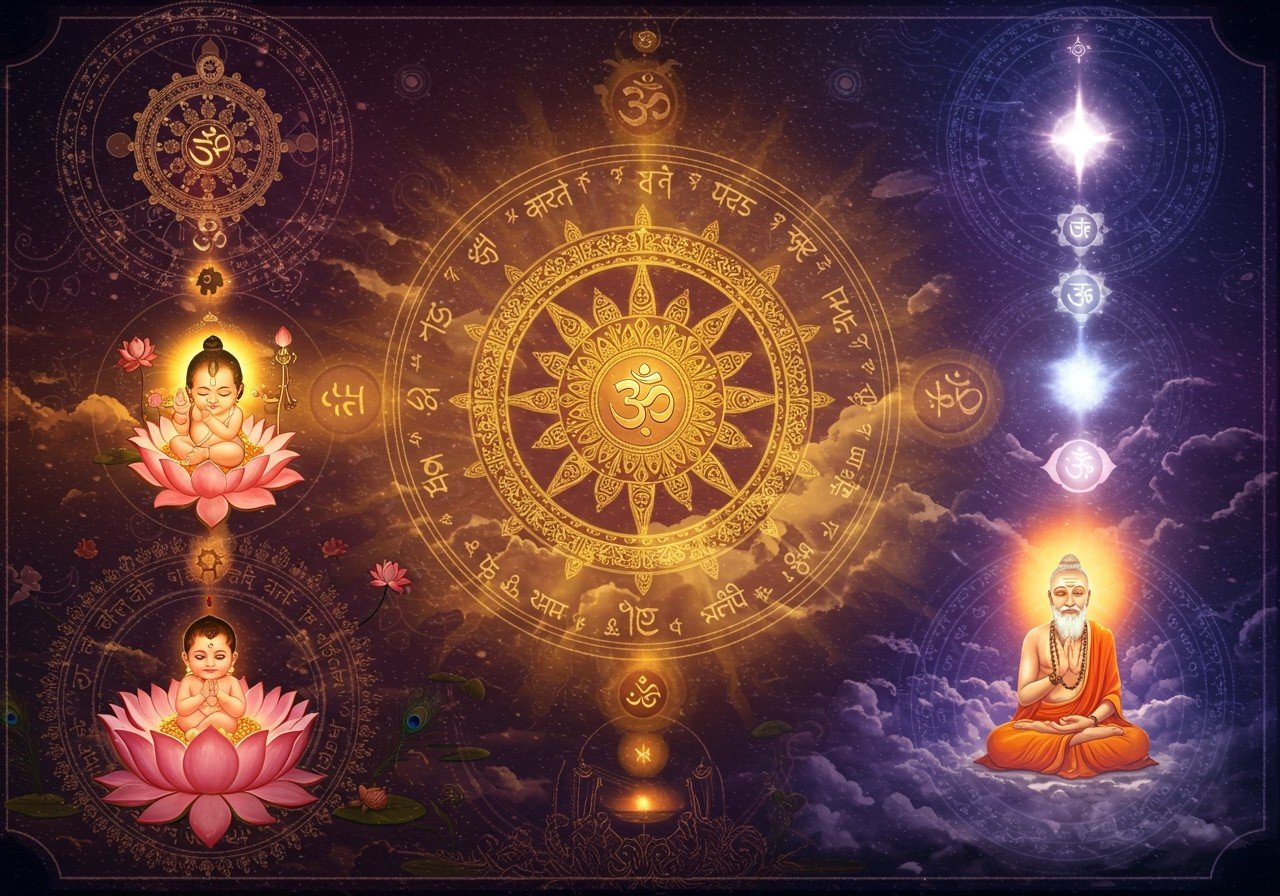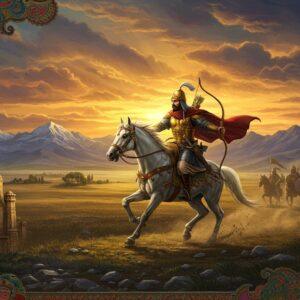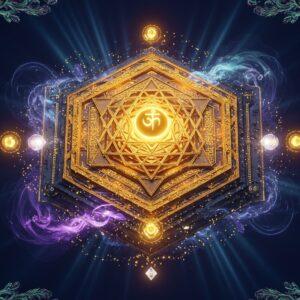Hindu Beliefs About Life and Death: Karma, Reincarnation, and Moksha

Hinduism offers a profound perspective on life and death, viewing them not as separate events but as integral parts of a continuous cycle called samsara – the cycle of birth, death, and rebirth. This cyclical view deeply influences Hindu beliefs and practices, emphasizing the importance of spiritual growth and the pursuit of liberation.
The Interplay of Karma, Reincarnation, and Moksha
Central to the Hindu understanding of life and death are the concepts of karma, reincarnation, and moksha. These interconnected principles shape the individual’s spiritual journey and provide a framework for ethical living.
Karma: The Law of Cause and Effect
Karma, often described as the law of cause and effect, emphasizes that every action, thought, and intention has consequences. These consequences shape not only the present life but also future lives. The Bhagavad Gita and the Upanishads offer detailed explanations of karma’s workings, highlighting its pivotal role in shaping an individual’s destiny and moral compass. Exploring the three types of karma—Sanchita (accumulated), Prarabdha (currently unfolding), and Kriyamana (being created)—provides a deeper understanding of how past actions influence the present, and present actions shape the future.
Reincarnation: The Cycle of Rebirth
Reincarnation, the belief in rebirth, is a cornerstone of Hindu philosophy. It posits that the soul, or atman, is eternal and embarks on a journey through multiple lifetimes. The form the soul takes in each life is determined by the accumulated karma of past lives. This continuous cycle provides opportunities for spiritual growth and evolution, with each life presenting new lessons and challenges. Embracing the concept of reincarnation encourages Hindus to live virtuously, fulfilling their societal duties (dharma) to ensure positive karma and progress towards spiritual liberation. By understanding and accepting this cycle of birth, death, and rebirth, individuals gain a broader perspective on life’s purpose and the importance of ethical living. It encourages actions aligned with dharma, promoting kindness and moral integrity, thus ensuring the soul’s continued evolution towards higher consciousness.
Moksha: Liberation from the Cycle
Moksha represents the ultimate goal in Hinduism—liberation from samsara and union with the divine. This state of spiritual enlightenment transcends the cycle of birth and death, freeing the soul from the limitations of the material world. Achieving moksha requires dedicated spiritual practice and a deep understanding of the true nature of reality. It’s a state of eternal bliss and freedom from earthly attachments, representing the culmination of the soul’s journey. Hindus pursue moksha through various paths, including the path of knowledge (Jnana Yoga), devotion (Bhakti Yoga), and selfless action (Karma Yoga), each offering a unique approach to spiritual fulfillment and the attainment of liberation.
Hindu Death Rituals and Practices
Hindu rituals surrounding death play a significant role in facilitating the soul’s transition to the next life. These rituals, known as antyesti or last rites, offer comfort to the bereaved and provide a framework for honoring the deceased. Guided by sacred texts like the Garuda Purana, family members perform these ceremonies with reverence and love, creating a supportive spiritual atmosphere for the departing soul. While regional variations exist across India, reflecting the country’s rich cultural diversity, the underlying purpose remains consistent: to ensure a peaceful and auspicious passage for the soul into the next stage of its journey. Poojn.in offers a comprehensive guide to Hindu rituals, shedding light on their significance and importance.
Death in Hinduism: A Philosophical Perspective
Hinduism views death not as an end but as a transition to another stage of existence. This perspective fosters acceptance of death as a natural and inevitable part of life, encouraging a focus on spiritual growth and detachment from worldly possessions. The teachings of revered Hindu philosophers and sages emphasize the importance of this acceptance, guiding individuals towards a life of balance, purpose, and spiritual awareness. To learn more about the core beliefs and practices of Hinduism, visit Exploring Hinduism: Core Beliefs and Practices.
Hinduism: A Celebration of Diversity and Tradition
Hinduism, a vibrant tapestry of traditions and beliefs, embraces diversity as one of its defining characteristics. Its rich history has given rise to a wide array of spiritual paths and practices, demonstrating its adaptability and inclusiveness. This intricate interplay of ancient wisdom and contemporary interpretations makes Hinduism a truly unique and ever-evolving faith. To learn more about the diverse traditions within Hinduism, explore Hinduism: A Celebration of Diversity and Tradition.
Modern Interpretations of Hindu Philosophy
In today’s world, Hindus continue to integrate traditional beliefs with modern lifestyles. The influence of globalization and technology has led to new interpretations and expressions of concepts like karma, reincarnation, and moksha. Online platforms provide convenient access to spiritual resources and puja items, bridging the gap between ancient traditions and contemporary life. This fusion of ancient wisdom and modern practicality allows individuals to engage with their faith in meaningful ways, adapting age-old practices to the complexities of modern society. These philosophies offer valuable insights for navigating contemporary existential questions and ethical dilemmas. Accessing authentic spiritual guidance and ritual items online bridges traditional practices with modern lifestyles, fostering a deeper connection to Hindu beliefs.
Poojn.in: Supporting Your Spiritual Journey
At Poojn.in, we recognize the profound connection between Hindu philosophy and the proper execution of rituals. As India’s leading Dashakarma Bhandar, we offer a wide selection of authentic puja items to support your spiritual practices, including:
- Krishna Puja Items: Complete sets for Krishna worship, including items specifically for Janmashtami and daily puja, fostering a deeper connection with Krishna’s teachings on dharma and karma. You can find a variety of Laddu Gopal murtis, perfect for Krishna worship, available here.
- Sacred Texts: Authentic copies of the Bhagavad Gita and other scriptures that delve into the concepts of karma, dharma, and moksha, offering guidance and deeper understanding. Explore the Sacred Texts of Hinduism to enhance your spiritual journey.
- Traditional Puja Materials: All the essential items for performing last rites and shraddha ceremonies, crucial for comprehending the cycle of life and death within Hindu philosophy. These include items like camphor and incense sticks, essential for traditional ceremonies.
- Pure Materials: All our puja items are sourced in accordance with traditional guidelines, ensuring the sanctity and authenticity of your religious practices. We understand the significance of using pure materials in your spiritual practices, which is why we prioritize quality and authenticity in all our products.
Visit www.poojn.in to browse our full collection of authentic puja items. We deliver across India, bringing the sanctity of tradition directly to your doorstep. Our knowledgeable team is ready to assist you in selecting the right items for your specific needs, ensuring your spiritual journey is supported every step of the way.
Embracing the Journey: Harmony and Balance
Hindu philosophy elegantly interweaves life and death, guiding us through the sacred journey of samsara. Embracing these concepts empowers us to live with purpose, kindness, and integrity. By incorporating the teachings of karma, reincarnation, and moksha, we embark on a path towards spiritual growth and eventual liberation. These timeless philosophies, coupled with the rituals and practices surrounding life and death, connect us to our heritage and provide wisdom for navigating life’s complexities with grace and resilience. Honoring these beliefs fosters harmony within ourselves and with the universe, leading to a balanced and fulfilling existence.
FAQs on The Hindu Philosophy of Life and Death
What is the Hindu philosophy of life?
The Hindu philosophy of life revolves around the concept of samsara, the cycle of birth, death, and rebirth. It emphasizes living a life of dharma (righteousness) to achieve spiritual progress and ultimately, liberation (moksha). This cyclical view shapes the understanding of existence, encouraging a focus on spiritual growth and ethical living.
How does karma affect life and death in Hinduism?
Karma, the law of cause and effect, plays a crucial role in Hindu beliefs about life and death. Good deeds generate positive karma, leading to favorable outcomes in future lives, while bad deeds create negative karma, resulting in less desirable circumstances. Karma influences the cycle of rebirth, determining the form and experiences of each life. Understanding karma’s influence encourages ethical actions and responsible living.
What is the concept of reincarnation in Hindu philosophy?
Reincarnation, central to Hindu philosophy, is the belief that the soul (atman) is reborn into a new body after death. The specific form and experiences of each life are determined by the accumulated karma of past lives. This continuous cycle provides opportunities for spiritual learning and growth, eventually leading towards liberation from the cycle.
How does moksha relate to the cycle of life and death?
Moksha, liberation from the cycle of birth and death (samsara), is the ultimate spiritual goal in Hinduism. Achieving moksha signifies the soul’s release from the limitations of the material world and its union with the divine. It’s a state of eternal bliss and freedom from the continuous cycle of reincarnation. Moksha represents the culmination of spiritual growth and the end of the soul’s journey through earthly existence.
Why is death considered a part of life in Hindu philosophy?
Death in Hinduism is not seen as an end but as a transition to another phase of existence within the larger cycle of samsara. This perspective fosters acceptance of death as a natural and inevitable part of life, encouraging a focus on spiritual development rather than fearing the end of physical existence. It allows for a broader understanding of life’s journey, emphasizing the continuous evolution of the soul.
How can one achieve moksha according to Hindu beliefs?
There are multiple paths to achieving moksha in Hinduism, each offering a different approach to spiritual growth and liberation. These paths include the path of knowledge (Jnana Yoga), the path of devotion (Bhakti Yoga), the path of meditation (Dhyana Yoga), and the path of selfless action (Karma Yoga). Each path offers a unique way to connect with the divine and progress towards spiritual enlightenment. Exploring these various paths allows individuals to find the approach that best resonates with their personal beliefs and spiritual aspirations.
What is the significance of rituals in Hindu philosophy of death?
Rituals surrounding death in Hinduism hold deep significance, both for the deceased and the bereaved. They are believed to assist the soul’s journey after death, ensuring a smooth transition to the next life. These rituals also provide comfort and closure for family members, allowing them to honor the deceased and participate in the sacred process of transition. The rituals provide a framework for expressing grief, offering prayers, and supporting the soul’s journey. They are an integral part of the Hindu tradition, connecting the living with the departed and reinforcing the cyclical nature of existence.
How do karma and reincarnation impact daily life in Hinduism?
The concepts of karma and reincarnation significantly influence daily life for Hindus. The understanding that actions have consequences (karma) that extend beyond the present life encourages ethical behavior and responsible decision-making. The belief in reincarnation further reinforces this, emphasizing the continuous journey of the soul and the importance of living a virtuous life to ensure favorable outcomes in future lives. These beliefs provide a strong moral compass, guiding individuals towards a life of purpose, integrity, and spiritual awareness.


